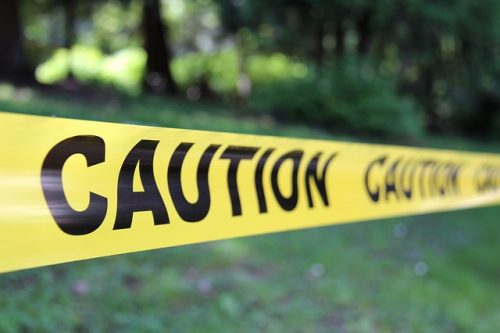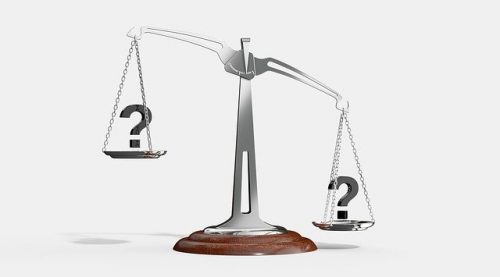I was already a sophomore in college when an old professor barged into my afternoon class to tell us that we would be excused from all classes the next day. The reason was that the local police department would talk to us about methamphetamines and other drugs that people often abused.
Many of my classmates were excited about this mini-seminar, considering it was exclusive for our department. They felt proud to think that those law enforcers would take the time out of their busy schedule to talk to many college kids regarding a relevant matter. In my head, though, it was not too surprising since we were Chemistry students. After all, among the students on the campus, who would likely have access to the lab and get their hands on the ingredients required to concoct a new type of illegal drug? It won’t be the teaching or music kids, for sure. It’s us.

When I strolled into the function hall the next day, I was excited initially for a different reason. My schedule had been toxic the entire semester, but I could not skip classes, no matter how much I wanted to. Hence, I initially intended to sit in that dark hall and nod off freely.
I was still awake when the police chief introduced the law enforcers who would act as keynote speakers on that day. Many of them worked hard at fighting and catching illegal drug trade in our city, so I clapped with everyone as I thought, “Yeah, yeah, drug busters in a drug seminar – a real shocker.” But then, I sat up straighter when the chief introduced a forensic psychologist.
“A forensic what?” I whispered to the girl on my right.
“Psychologist,” she replied, repeating what we both heard.
“Huh,” was all I said.
As a fan of crime shows, I already heard about forensic scientists going to crime scenes to study the place, the possible murder weapon(s), and whatnot. As a Chemistry major, I also got wind of forensic chemists who helped solve crimes by testing the toxicology of substances and giving a name to unknown chemicals found in the scene. In truth, I even considered following the latter path after graduation because of how valuable that job was. And now, here’s this lady – a forensic psychologist. I knew in that instant that I could not fall asleep during that seminar. I needed to wait for her turn to speak as I was incredibly interested in the field of forensic psychology.
What does a forensic psychologist do?
A forensic psychologist does the following:
- Collect physical evidence for analysis and interpretation.
- Interview different people connected to the crime.
- Create a profile for the criminal.
- Assess mental disorders in accused individuals.
- Find out if a person is mentally healthy enough to join a trial.
- Offer counseling to prisoners.

What skills do you need to be a forensic psychologist?
These are the skills that every forensic psychologist needs:
- Attentiveness: Considering you are most likely working with people who may be hiding under too many layers of lies, you need to be extremely observant with their facial expressions, speech, and overall body language.
- Compassion: No matter how heinous a crime is, remember that even a criminal needs compassion. Hence, a forensic psychologist’s task is to determine if they are mentally fit to attend a trial.
- Critical Thinking: Forensic psychology is a mix of diverse disciplines to think in the psychological or sociological sense when you need to decide on things. Instead, it will be best to think critically every time to come up with an excellent decision.
- Effective Communication: Forensic psychologists should excel at appropriating your tone or choice of words on the situation. That is especially true when you are dealing with aggressive people who may snap anytime and attack you.
- Objectiveness: A forensic psychologist needs to set their opinions or emotions aside at work, primarily when talking to criminals or victims (or their families). Although it is common to feel awful while interviewing people, you should cast that feeling aside and start being objective.
Is forensic psychology dangerous?
Yes, forensic psychology tends to be dangerous, although it is not as dangerous as what people who study criminal justice or criminology may face. After all, forensic psychologists try to work closely with all kinds of criminals almost every day to figure out why they have committed a crime. This entails that you may be around dangerous individuals or, worse, locked in a confined room with them.
Nevertheless, aspiring forensic psychologists should keep in mind that your safety is of utmost importance. While it is ideal to have a one-on-one conversation with a criminal, you may request a police escort anytime. That is especially true if the individual seems highly aggressive.
What is the difference between a forensic psychologist and a criminal psychologist?
Though forensic and criminal psychologists may seem to be the same, they have distinct job descriptions. In reality, law enforcement tends to dispatch a forensic psychologist to the crime scene with police officers to assess any physical evidence and interpret how it connects to the criminal. They try to trace what may have led the latter to commit a crime and go as far as interviewing witnesses and victims (if possible) before explaining the matter in court.
As for criminal psychologists, they usually do most of their work behind the desk. When they receive a case file, they tend to analyze all known records that may convict or free an individual. If there is no substantial evidence to work with, they may visit the prison and converse with criminals in question to understand their actions.
Do criminal psychologists work with serial killers?
Yes, criminal psychologists work with serial killers, although not all of them do or can. It typically starts when the law enforcement asks them to talk to the convicted people to determine the reason behind their heinous acts. Sometimes, they may need to talk to the serial killers’ confidantes or relatives to understand how their minds work. The information that criminal psychologists gather may then be used in court.

Which is better, psychology or criminology?
The answer to this question solely depends on what you want to achieve as a professional. For instance, if you’re going to help people understand why they feel so sad, angry, delusional, or do things that normal individuals never do, psychology is better than criminology. In case you want to help people obtain criminal justice or ensure that a crime never happens again, then criminology is better than psychology.
What is a forensic criminologist?
A forensic criminologist is a criminality expert who may or may not work at a law enforcement agency. In truth, insurance companies, local governments, and other facilities may have at least one forensic criminologist. Despite that, all forensic criminologists have the same goal: to figure out what may have caused the crime based on behavioral patterns.
Is it hard to be a forensic psychologist?
Yes, it is hard to become a forensic psychologist. For one, getting a doctoral degree is a must; otherwise, your career may not progress. Before writing your dissertation, you also need to ensure that it focuses on your field of interest. On top of that, you are required to go into internships, join the American Psychology-Law Society, volunteer at forensic-related facilities, and stay updated with forensic psychology journals.
Is psychology criminology?
No, psychology is not criminology – they are only related but not synonymous to each other. It is relatively easy to tell the two terms apart. Psychology studies how thought patterns dictate how a person feels or behaves, while criminology studies crime and actions that violate social or legal norms.
What can I do with criminology with a psychology degree?
If you have earned criminology with a psychology degree, you can seek a broader range of jobs than when you only have a single field of expertise. For instance, you may join law enforcement and become a probation or police officer. In case you don’t want to be a law enforcer, you may become a data analyst, academic researcher, offender case administrator, etc.
Is criminology psychology or sociology?
Criminology technically falls under the sociology category, even though many people mistake it as a psychology branch. This confusion is not surprising, given that criminology can have both psychological and sociological aspects. However, since this field does not focus on improving their thinking or behavior, sociology covers it more.
Is it hard to be a criminal profiler?
Yes, it is challenging to become a criminal profiler. You may not realize it while still trying to earn a bachelor’s degree, but once you are done studying, the vast number of training programs you must sign up for may reveal the truth. Not to mention, it can take years – or more than a decade for some – before you can apply for a criminal profiling job.
Is an FBI profiler a real job?
Yes, an FBI profiler is a real job that allows people to earn money and help the community. However, a profiler technically does not qualify to be called an FBI agent, considering their background and training are different. Instead, a profiler is more appropriately known as an FBI special agent.

How do you become a profiler for the FBI?
If you want to become an FBI profiler, you need to do the following:
- Focus on government or psychology courses during your secondary level. If possible, try volunteering at a law enforcement agency in your area before graduation.
- Obtain a related bachelor’s degree. In case you cannot get into the forensics program, you may consider law, psychology, criminal justice, and other four-year associated degrees. This is practically your ticket to a law enforcement academy.
- Speaking of which, you must send your application to a law enforcement academy. Once accepted, you most likely need to attend classes for three to five months. They may ask for other requirements, including proof of US citizenship, driver’s license, lack of criminal record, etc.
- Spend several years gaining experience in the field. Truth be told, you should prepare to do that for up to 15 years, depending on your skills.
- Don’t stop training, no matter how busy you are. Various institutions offer hands-on practice, but BSU provides the most prestigious ones. If you prove your skills well, you may get invited to train at an FBI academy.
- Consider furthering your education while waiting to become a profiler. Many successful FBI profilers have earned their master’s or doctoral degree, which supposedly helps them secure their position.
What’s the most an FBI agent can make?
An FBI agent’s salary depends on the General Schedule, a 15-grade pay system that governs most white-collar federal jobs. For reference, according to various reports, an agent at a GS-10 pay level may have a starting fee of $52,000 annually by 2020. Two years before that, the minimum pay was approximately $48,000 for the same level.
Final Thoughts
I left that seminar feeling like I discovered another dimension. I still wanted to become a forensic chemist someday. Still, I also felt a new interest in taking a few psychology classes in the following semester to understand how a human mind could work. It was made up of a complex network of neurons; after all – any change in those connections could make someone snap and commit a crime. I believe it would eventually help me find my footing in the law enforcement field someday.